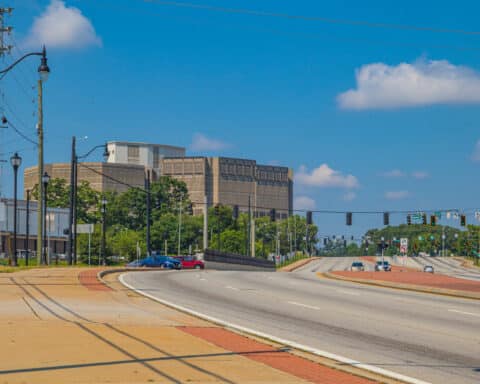New data showing COVID-19 is hitting black Georgians far harder than others is sparking an outcry among state leaders.
Some politicians and activists are calling for bold reforms at the federal and state levels to redress long-standing inequities that continue to lead to disparate outcomes for people of color.
“We’re going to have to go a lot further,” Rep. Hank Johnson told the Recorder in an interview.
The calls come as a video of the killing of an unarmed black man went viral, flaring racial tensions in the state and across the nation. The video showed the February shooting of Ahmaud Arbery, a 25-year-old who was jogging in the suburban Glynn County neighborhood. He was confronted at the time by two white men with guns in a pickup truck, who were later charged with his murder soon after the Georgia Bureau of Investigation took on the case last week.
African Americans comprise about one-third of Georgia’s population but make up more than four-fifths of hospital patients with COVID-19, according to a study released at the end of April by the U.S. Centers for Disease Control and Prevention. Of 305 patients surveyed in eight Georgia hospitals, 247 — more than 80 percent — were black, the study found.
In Georgia and other states, black Americans are dying from COVID-19 in disproportionate numbers, according to APM Research Lab.
“When white people get a cold, black people get COVID-19,” said Nathaniel Smith, founder of the Partnership for Southern Equity in Atlanta — tweaking the adage that black people catch pneumonia when white people catch a cold. “We have to change that,” he said.
He and others pointed blame at historic and structural inequities.
“It’s not because we are more susceptible to the coronavirus that we are being hospitalized and dying,” Johnson said at a Congressional Progressive Caucus hearing this month on racial disparities amid the pandemic. “It’s because of the legacy of pervasive, systematic and systemic racism that is grounded in the soil of America.”
State Sen. Nikema Williams, chair of the Georgia Democratic Party, agreed. “This didn’t just start with the coronavirus,” she said on a press call. “It has only put a spotlight on what has always existed in our communities.”
Black people are more likely to have underlying health conditions, and less access to care. And the health care system is biased against them, Johnson said, citing studies that show African Americans are less likely to receive prescription pain medicine than white people and are “spoken to” rather than “listened to” by providers. He also noted mistrust of the system in the black community due to past abuses, which impedes access to care and treatment.
Black people face other forms of structural inequity that put them at high risk. They are more likely to live in poverty than whites or Latinos, according to the Center for American Progress. And they have higher unemployment rates, fewer job opportunities, lower pay and greater job instability as a result of discrimination and racism, the center reports.
‘A lot to do’
The federal government has approved nearly $3 trillion so far in response to the pandemic, including $60 billion for loans to businesses in underserved communities. The funds were approved amid reports that minorities and others were being denied federal loans.
Congress authorized money for mobile testing, which Johnson said was a priority of the Congressional Black Caucus. And it has approved provisions to protect credit scores and provide some rent abatement and mortgage relief, Johnson said Tuesday during a Georgia Legislative Black Caucus virtual town hall meeting.
But he and others called for more action at the federal and state levels.
Williams and other state lawmakers called on GOP Gov. Brian Kemp to fully expand Medicaid so more low-income people have access to health care during and after the pandemic.
And they said Kemp should reconsider his decision to reopen the state’s economy.
Black Georgians are “between a rock and a hard place” because they are now forced to choose between their income and their health, state Rep. William Boddie said.
At the federal level, Johnson called for “strong support” for essential workers in the next round of coronavirus legislation, which he said could come this month. And he wants to boost funding for federal food benefits, strengthen pension support, expand unemployment insurance and direct payments for individuals, and aid state and local governments.
“We have a lot to do,” he said.
The Congressional Black Caucus is pushing for a long-term comprehensive strategy to address underlying health problems and disparities and to fully fund the Office of Minority Health at the U.S. Office of Health and Human Services.
Caucus members also want more complete data, concentrated testing in black communities and free personal protective equipment for essential workers, Johnson spokesman Andy Phelan said. They also want more resources for community- and faith-based organizations and stronger federal partnerships with schools and organizations serving black communities, he said.
The Partnership for Southern Equity, meanwhile, is calling for a nationwide moratorium on shutoffs of utilities such as electricity, water, and broadband internet, among other things.
Ultimately, though, creating a more equitable system will require the “revolution of values” that Martin Luther King Jr. called for long ago, said Smith of the Partnership for Southern Equity.
“At the end of the day, we can’t afford to go back to the way things were,” he said. “Regardless of what Congress does … if you’re utilizing an inequitable system in order to push those dollars out, then we’re going to continue to have the inequitable outcomes that we see.”
Disclosure: This article may contain affiliate links, meaning we could earn a commission if you make a purchase through these links.






